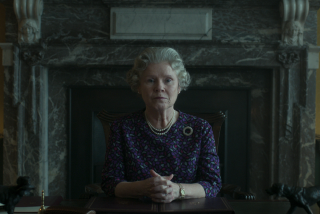Study Finds the Queen’s English Has Acquired Common Touches
- Share via
LONDON — Ho, ho, ho, Henry Higgins, the queen’s English ain’t wot it used to be.
At least, that’s what three Australian researchers have discovered after listening to tapes of decades of Queen Elizabeth II’s annual Christmas broadcasts. Her majesty’s vowels are gradually slipping under the influence of younger and--dare say--lower-class Britons.
It isn’t quite the cockney twang that the Sun tabloid suggested in an editorial cartoon Thursday showing the queen reading her Christmas message: “Me ol’ man an’ me wish all you punters a right ol’ knees up. . . .”
No one has yet heard her refer to her family as the royal ‘Ouse of Windsor.
Nor has the “My Fair Lady” professor been called in for her elocution lessons, to drill the queen on “the rain in Spain.”
But the accent is a tad less posh.
“There has been a drift in the queen’s accent toward one that is characteristic of speakers who are younger and/or lower in the social hierarchy,” the researchers said in this week’s Nature magazine.
“In the last 40 or so years, there have been dramatic changes to the social class structure in Britain, and to a certain extent this is reflected in pronunciation,” Jonathan Harrington, the lead researcher, told the British Broadcasting Corp.
The speech experts, from Macquarie University in Sydney, said they had the permission of Buckingham Palace to study the queen’s accent. The BBC provided the tapes.
The researchers compared the queen’s speeches from the 1950s with those in the 1980s to see if there was any movement toward the “standard southern British” accent as spoken by BBC broadcasters.
They found that the queen’s accent had “moved toward but not attained” the more common touch.
The changes are subtle, the researchers acknowledged, possibly unnoticed by most royal subjects, for whom the queen’s speech still has that cut-glass quality associated with the upper crust. But there are changes, nonetheless.
In the queen’s 1950s broadcasts, for example, the word “had” rhymed with “bed,” while 30 years later, it sounded more like “bad.” And a “grindsman” who mows the lawn has become a “groundsman.”
John Wells, a phonetics professor at University College, London, explained that all languages constantly evolve.
“Nobody anywhere speaks a language the way it was spoken 100 years ago,” said Wells, the author of the Longman Pronunciation Dictionary.
In the United States, British English was long considered to be the correct English, used in high society and taught in drama schools, until World War II, when American English came into its own.
Now British English has undergone a similar change.
“There is no longer a deference to received pronunciation,” Wells said. “It doesn’t set the trend. In fact, the new phenomenon is that the upper classes are moving downward. An accent is a badge of who you are and where you want to go. Since the 1960s and the Beatles, people stopped wanting to be like the upper classes and started wanting to be like working-class England.”
Whether or not the queen sought to emulate the Beatles, she has been affected by the changes around her. “The queen talks to a lot of people,” Wells said. “She watches TV.”
What is she hearing?
According to the Times of London, “aiches are dropping like flies and the letter ‘l’ has morphed into the letter ‘w’ in words such as bill, wall and milk.”
Like millions of her subjects, the Guardian newspaper added, the queen has picked up the glottal stops and flattened vowels of “estuary English,” from the Thames Estuary region.
“What they found . . . is that the queen no longer speaks the queen’s English,” the Guardian said. “In any other country, such musings would interest philologists only. But since this is Britain, they amount to a significant discovery--the blurring of class lines.”
The Guardian, which recently advocated the abolition of the monarchy, accused the queen of “simply trying to get in on the act” with her acquired vowel sounds.
“They are nothing if not adaptable, these royals,” the Guardian said. “Ain’t that the truth, yer madge?”
More to Read
Sign up for Essential California
The most important California stories and recommendations in your inbox every morning.
You may occasionally receive promotional content from the Los Angeles Times.













